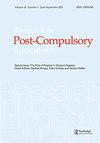“表面之下”:继续教育领域的权力和专业精神
IF 0.9
Q3 EDUCATION & EDUCATIONAL RESEARCH
引用次数: 1
摘要
传统上,英语继续教育(FE)系统中的专业主义被认为是卓越的教学实践、态度和行为。因此,“好工作”的概念是本文分析的核心。遵循布尔迪乌主义的传统,专业主义被视为财经教师和管理人员之间的“斗争场所”,管理人员拥有改变“好工作”定义和实质的权力。这对教师如何理解和谈论专业精神有影响,并突出了当教师与管理者持有不同观点时产生的不和谐。根据对461份回应的调查,该分析做出了三个贡献:首先,专业主义被理论化为一种象征性资本,演员通过获取和部署文化、社会和经济资本来获得这种资本。其次,它显示了资本不平等如何影响教师获得专业认可的感知机会。最后,它揭示了拥有最大权力的高级管理人员,在生产“好数据”的基础上执行专业的合规模式,这是财经领域的合法资本,即使这被证明是对教师的专业化。本文章由计算机程序翻译,如有差异,请以英文原文为准。
‘Below the surface’: power and professionalism in the further education sector
ABSTRACT Professionalism in the English Further Education (FE) system has been traditionally discussed in terms of superior teaching practices, attitudes and behaviours. The concept of ‘good work’ is therefore central to this paper’s analysis. Following a Bourdieusian tradition, professionalism is treated as a ‘site of struggle’ between FE teachers and managers, where managers hold the power to change the definition and substance of ‘good work’. This has implications for how teachers understand and speak about professionalism and highlights the discord that arises when teachers hold different viewpoints from managers. Drawing on a survey of 461 responses, the analysis makes three contributions: first, professionalism is theorised as a form of symbolic capital which actors attain by acquiring and deploying cultural, social and economic capital. Second, it shows how inequalities in capital can affect teachers’ perceived opportunities for professional recognition. Finally, it reveals that senior managers, with the greatest power, enforce a compliance model of professionalism based on the production of ‘good data’, which is the legitimate capital in the FE field, even when this is shown to be deprofessionalising to teachers.
求助全文
通过发布文献求助,成功后即可免费获取论文全文。
去求助
来源期刊

Research in Post-Compulsory Education
EDUCATION & EDUCATIONAL RESEARCH-
CiteScore
1.30
自引率
14.30%
发文量
31
期刊介绍:
Throughout the world, there is a growing awareness of the significance of vocational and post-compulsory education and training systems. The majority of countries are working hard to develop their provision, recognising the importance of post-compulsory education in providing educated and skilled people in sufficient numbers at appropriate levels to assist economic and social development. Research in Post-Compulsory Education, sponsored by the United Kingdom"s Further Education Research Association (FERA), recognises the need for more international research and analysis and the generation of relevant theory in order to identify policy needs and trends as well as priorities in this growing area.
 求助内容:
求助内容: 应助结果提醒方式:
应助结果提醒方式:


